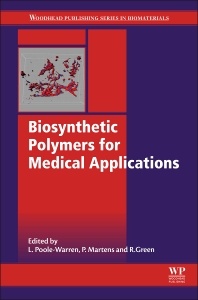Biosynthetic Polymers for Medical Applications Woodhead Publishing Series in Biomaterials Series
Coordonnateurs : Poole-Warren Laura, Martens Penny, Green Rylie

Biosynthetic Polymers for Medical Applications provides the latest information on biopolymers, the polymers that have been produced from living organisms and are biodegradable in nature. These advanced materials are becoming increasingly important for medical applications due to their favorable properties, such as degradability and biocompatibility.
This important book provides readers with a thorough review of the fundamentals of biosynthetic polymers and their applications. Part One covers the fundamentals of biosynthetic polymers for medical applications, while Part Two explores biosynthetic polymer coatings and surface modification. Subsequent sections discuss biosynthetic polymers for tissue engineering applications and how to conduct polymers for medical applications.
1. Introduction to biomedical polymers and biocompatibility
2. Non-degradable polymers for Biomedical applications
3. Biodegradable/Bioerodible polymers for medical applications
4. Bio-inspired antimicrobial polymers
5. Plasma modifications for direct cell growth and response
6. Stent coatings for blood compatibility
7. Degradable hydrogel systems
8. Hydrogels and angiogenesis
9. Engineering biosynthetic encapsulation systems
10. Conducting Biosynthetic Polymers as Biomaterials
11. Conducting polymers for neural interface applications
12. Degradable Conjugated conducting Polymers and Nerve Guidance
Biomaterials and chemical scientists in R&D and academia; in addition to polymer scientists, it should appeal to researchers concerned with tissue engineering, drug delivery and conducting materials
Professor Poole-Warren continues to lead a research group in biomedical engineering focusing on design and understanding of biosynthetic polymers for medical applications.
Dr Penny Martens is a Senior Lecturer with the Graduate School of Biomedical Engineering. Her research focuses on the use of biosynthetic hydrogels for a variety of biomedical applications, including diabetes treatment, neural electrodes and cartilage repair.
Dr Rylie Green is a Research Fellow with the Graduate School of Biomedical Engineering. Dr Green’s research has been focused on developing bioactive conducting polymers for application to medical electrodes, with a specific focus on vision prostheses. More recently Dr Green has been exploring hybrids of conducting polymers and hydrogels to reduce strain mismatch with neural tissue and improve long-term cell interactions at the neural interface through drug delivery.
- Comprehensively covers all major medical applications of biosynthetic polymers
- Provides an overview of non-degradable and biodegradable biosynthetic polymers and their medical uses
- Presents a specific focus on coatings and surface modifications, biosynthetic hydrogels, particulate systems for gene and drug delivery, and conjugated conducting polymers
Date de parution : 11-2015
Ouvrage de 358 p.
15x22.8 cm
Thèmes de Biosynthetic Polymers for Medical Applications :
Mots-clés :
Angiogenesis; Antibiotics; Antimicrobial peptides; Bioactuator; Biocompatible; Biodegradable; Bioerodible; Biomaterial; Biomaterials; Biomedical devices; Biomedical polymers; Biosensor; Biostability and compatibility; Blood; Cell attachment; Cell encapsulation; Coating; Conducting polymer; Conductive elastomer; Conductive hydrogel; Conductive polymer; Degradation; Double network; Drug delivery; Drug-delivery system; Electrospinning; Guidance cues; Hydrogel; Hydrolysis; Materials; Medical implants; Mobile biologics; Natural polymer; Neural electrode; Nondegradable; PANI (polyaniline)PEDOT (poly(3; 4-ethylenedioxythiophene))PPy (polypyrrole)PT (polythiophene)Performance; Photodegradation; Plasma polymer; Polymer�drug conjugates; Polymer; Polymerisation; Pores; Pro-angiogenic; Restenosis; Scaffold; Stem cells; Synthesis and properties; Synthetic polymer; Synthetic polymers; Thrombosis; Tissue engineering; Vasculogenesis



